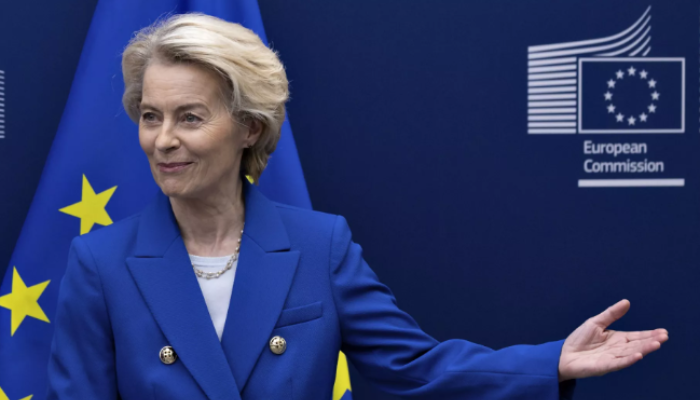The European Union has decided to pause its planned counter-tariffs against the United States in an effort to allow more time for ongoing negotiations. This move, which aims to defuse escalating trade tensions, was announced by European Commission President Ursula von der Leyen.
Initially, EU member states approved a series of retaliatory tariffs targeting nearly €21 billion in American goods, including soybeans, copper, and motorcycles, in response to U.S. tariffs on steel and aluminum. The first wave of these tariffs, valued at €3.9 billion, was set to take effect on April 15, 2025. However, in a shift of strategy, these measures will now be put on hold for 90 days.
Von der Leyen’s Statement on Trade Talks
Von der Leyen emphasized that the EU is willing to “give negotiations a chance” to avoid further escalation of the trade dispute. In a brief statement, she explained that while preparations for countermeasures would continue, the European Union would hold off on implementing them as negotiations progress. “If negotiations are not satisfactory, our countermeasures will kick in,” she added, signaling that the EU remains prepared for further action if needed.
This decision comes shortly after former U.S. President Donald Trump announced a temporary pause on his administration’s “reciprocal tariffs” for 90 days. Under these tariffs, the EU was initially set to face a 20% rate on various products, a move that the European Commission had previously criticized as unjustified. Following Trump’s pause, EU goods entering the U.S. will now face a 10% rate, while steel, aluminum, and cars will continue to be subject to a 25% tariff.
Impact of the Suspension
The EU’s suspension of counter-tariffs reflects a cautious optimism that trade tensions can be reduced through dialogue. However, von der Leyen’s remarks also underline the EU’s readiness to take further action if the negotiations do not yield satisfactory results. “All options remain on the table,” she said, suggesting that the EU is keeping its strategies flexible in response to the uncertain nature of U.S. trade policies.
Furthermore, von der Leyen reiterated her proposal for a “zero-for-zero” tariff deal on all industrial goods, a suggestion that had previously been rejected by the Trump administration. The proposal remains part of the broader effort to bring about a more comprehensive and fair trade agreement between the two economic giants.
Looking Ahead: What’s Next for EU-US Trade Relations?
The temporary suspension of counter-tariffs has created a brief window for negotiations, but the future of EU-US trade relations remains uncertain. Both sides have expressed interest in finding a resolution, but underlying issues related to tariffs and trade barriers continue to challenge any lasting agreement.
As the 90-day suspension period unfolds, global markets will be closely monitoring any developments in the trade talks. The EU’s willingness to engage in discussions could lead to a de-escalation of tensions, or it could signal more intense negotiations if both sides fail to find common ground.
This developing story is expected to evolve rapidly, and updates will be provided as new information becomes available.

